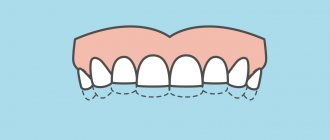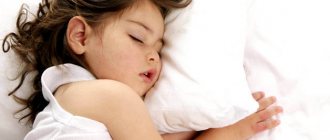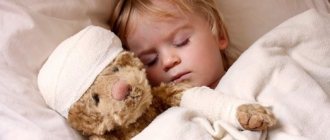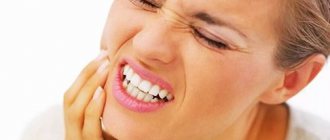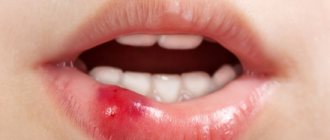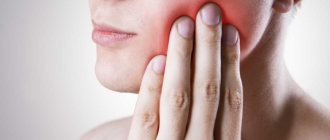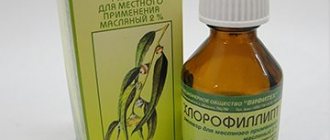Many children sometimes grind their teeth at night, frightening their caring parents. Some babies can grind their teeth for several minutes, others make isolated grinding noises. This phenomenon is medically called bruxism. Let's figure out whether this is dangerous to health, and what reasons can provoke this condition.
Very often, the fact that a child grinds his teeth in his sleep is explained by the presence of worms. Many parents, as soon as they hear that their child is making characteristic sounds, immediately run to the pharmacy and buy drugs that help get rid of helminths. But more often than not, such actions are not able to lead to a positive result, since the opinion about the presence of parasites is most often a common misconception. Even if you have any suspicions that your baby may have intestinal parasites, it is better to consult a doctor, submit the necessary results and wait for his findings. Remember that uncontrolled use of anthelmintic drugs is not as safe for the body as it seems at first glance. When such drugs enter the baby’s body, they not only have a toxic effect on parasites, but also on other cells. In addition, in most cases, children grind their teeth in their sleep for completely different reasons.
Minor defect?
Grinding of teeth in a child may seem like a minor deviation from the norm only at first glance. It’s good when this phenomenon is temporary and at the age of 5–6 years, bruxism in a child goes away on its own. But if your first-grader continues to grind his teeth at night, don't hesitate to seek medical help. Otherwise, even the permanent teeth that will replace the milk teeth will be at risk.
Treatment approaches
The disease is treated through the joint efforts of neurologists and dentists. The main goals of therapy are the elimination of stress, local manifestations of pathology, and the prevention of complications on the masticatory apparatus. A combination of means and methods is used:
- pharmacotherapy - muscle relaxants, antioxidants, vitamins, amino acids, sedatives;
- physiotherapy;
- psychotherapy;
- treatment of snoring, apnea.
Dental intervention consists of correcting the bite, periodontal damage, making removable aligners, and splinting. The extent of intervention depends on the severity of the violations. In advanced cases, surgical reconstruction may be required.
It is important to identify adolescent bruxism in the early stages to prevent serious consequences.
Symptoms of childhood bruxism
- Headache in the morning
- Feeling of fullness in the ears
- Complaints of pain in the back
- Unmotivated irritability and tearfulness
- Restless sleep with frequent crying
- Lack of appetite
- Rapid tooth wear (this symptom can only be determined by a dentist during an examination!)
Attention!
A high temperature and grinding of teeth in a child may be a reaction of the body to a routine vaccination carried out the day before.
GRINDING OF TEETH IN YOUR SLEEP – ARE WORMS TO BE TO blame?
Grinding your teeth in your sleep has an official medical term – bruxism. Doctors do not consider this phenomenon a disease; it would be more accurate to call it a condition that can arise for various reasons. For a long time, even educated people seriously believed in the myth that bruxism is caused by helminthic infestation.
Mothers passed on to each other by word of mouth advice to give their child an anthelmintic drug. However, in reality, teeth grinding at night has nothing to do with worm infection. The authoritative pediatrician Dr. Komarovsky has repeatedly tried to debunk this misconception. Worms can be present in the body of any child, regardless of whether he grinds his teeth or not.
In the case of helminthic infestation, the symptoms will be completely different:
- stomach ache;
- headache;
- unstable appetite;
- attacks of nausea and vomiting;
- bowel dysfunction (constipation alternating with diarrhea);
- itching in the anus.
The baby's skin may become pale and dark circles appear under the eyes. The child experiences weakness and shows irritability. A blood test can indirectly confirm helminthic infestation. Worm eggs are detected during clinical examination of stool.
As for bruxism, it is caused by various pathological conditions not related to parasitic infection. You can get rid of this symptom in a child only by eliminating the original cause, but this must be done. In some cases, children grind their teeth so much that they wear them down and this becomes a serious problem. Sometimes parents hear a terrible grinding sound even from the next room.
Teeth grinding is caused by repetitive movements of the lower jaw and chewing muscles. Bruxism is divided into nighttime (uncontrolled), daytime (partially controlled) and combined. The pathology occurs in approximately one third of all preschool children. Currently, bruxism has not been sufficiently studied, but work in this direction is constantly being carried out.
Causes of teeth grinding in children
Switching to artificial feeding
Teeth grinding in a child aged 8–10 months may be associated with early weaning from the mother's breast. This is extremely stressful for the baby. According to statistics, it is male “artificials” who most often suffer from bruxism. In this regard, increased attention should be paid to ensuring that the baby receives breast milk in full for as long as possible. To do this, the mother is advised to maintain a drinking regime, regularly express excess milk and avoid worries.
Teeth cutting or changing teeth
Teeth grinding during the day, which parents can notice by a specific sound, usually appears after the eruption of another baby tooth. The child is simply curious about new sensations, and he “plays”, deliberately creating friction between the teeth. As a rule, he quickly gets bored with this, but years later, when baby teeth are replaced with permanent ones, the picture may repeat. Read more about teething in this article.
Dental pathologies
When a child turns one year old, teeth grinding may indicate the presence of some abnormalities in the functioning of the dental system. An incorrect bite, inflammation of the jaw or pathological development of the joint are reasons to “grind” in order to more conveniently position the teeth in the mouth. Only an orthodontist can determine the specific cause. Read more about this here.
Stressful situations
If the day has come and a child of 2–3 years old does not stop grinding his teeth, this is a signal of a problem in his nervous system. In this way, the baby reacts to the stress he has experienced. The trigger for this can be both strong negative emotions (separation from a favorite toy, starting a visit to kindergarten or “eviction” from the parents’ bed), as well as positive ones that lead to strong overexcitation (outdoor games, the arrival of relatives with other children, etc.) .
Sleep disturbance
If a child has difficulty falling asleep, snores, mumbles in his sleep, suffers from enuresis or somnambulism, this may cause teeth grinding at night. Inadequate sleep negatively affects the child’s body and is a trigger for spasms of the masticatory muscles. The task of parents is to ensure that the baby gets enough sleep.
Wrong diet
Sometimes the reasons for teeth grinding in a child’s sleep lie on the surface - the parents themselves are responsible for this, having failed to create an optimal feeding regime. In order not to provoke involuntary contractions of the masticatory muscles, the last meal should be completed 2 hours before going to bed. Kefir is allowed 1 hour before bedtime.
Avitaminosis
Are you looking for reasons why your child grinds his teeth during the day? Analyze how much vitamins and minerals he receives from food during breakfast, lunch, afternoon snack and dinner. A deficiency of B vitamins, coupled with insufficient intake of magnesium and calcium into a growing child’s body, can lead to overstrain of the masticatory muscles. Only a pediatrician should determine the required dosage of a particular vitamin after an examination.
Upper respiratory tract diseases
Coughing and grinding of teeth in a child along with nasal congestion are a characteristic manifestation of sinusitis or bronchitis. In this case, bruxism will go away as soon as the disease that caused it is cured. If you notice that your cough does not go away, despite all the traditional measures taken to combat it, then do not delay a visit to an infectious disease doctor.
ENT diseases
Grinding of a child's teeth at night is also one of the main symptoms of adenoiditis - inflammation of the tonsils. The complex of unpleasant sensations caused by an increase in the size of the adenoids literally forces you to grind your teeth. The first thing that should alert parents in this situation is a constantly slightly open mouth.
The famous pediatrician Komarovsky claims: bruxism in children is more likely to occur if their parents suffered from it in childhood!
Content
- What caused the development of the disease?
- Signs of Bruxism
- Recognition of pathology
- Treatment of bruxism
- The most effective methods of treatment
- Kappa in the treatment of bruxism
- How can the patient help himself?
- Children and bruxism - factors in the onset of the disease and its treatment
- What danger does the disease pose?
What caused the development of the disease?
Factors in the appearance of this unpleasant phenomenon can be various disorders in the structure of the jaw, joint deviations, problems in the field of dentistry and emotional and psychological reasons. Some claim that teeth grinding at night indicates the presence of worms in a person. Of course, such an assumption may turn out to be correct, because if a parasite lives in the body, then people suffer from a lack of B vitamins, which ensure emotional stability.
Psychologists think that neurosis, being under constant stress or depression can lead to the appearance of bruxism, since these conditions contribute to increased tension in the facial and jaw muscles and intense clenching of the teeth. During the daytime, the pathology is controlled by the body, but at night, during sleep, it manifests itself in the form of teeth grinding. If a person is in frequent stressful situations, then bruxism is characterized by periodic reminders of oneself. As for neuroses, the disease manifests itself much more painfully. To get rid of pathology, it is necessary to normalize a person’s nervous state.
In adults, complexes that are laid down at a subconscious level can also become the causes of this disease. Or, if a person is unable to resolve any issue or influence anything in real life, in a dream all his anger and tension, not released, will manifest itself in the form of grinding his teeth.
Bruxism can torment a person who suffers from sleepwalking or apnea, as well as nightmares. Often, teeth grinding becomes a sign of many diseases of the nervous system.
Important: in adults, various dental problems such as malocclusion or poorly installed braces also affect the development of bruxism. Treatment in such a case is prescribed by a dentist.
Signs of Bruxism
The very first and main sign of the disease is very strong grinding of teeth during sleep. This phenomenon lasts from a few seconds to a couple of minutes and occurs repeatedly. The attack comes unexpectedly. The pathology is often accompanied by great tension, restlessness, eating and sleeping disorders, and irritability. Among other things, the disease can cause headaches, pain in the joints and muscles of the face, increased sensitivity of the teeth and the appearance of cracks in them.
Recognition of pathology
First of all, you should consult a dentist with such a problem. Based on the patient's complaints and dental examination, a diagnosis of Bruxism will be made. The factors that contributed to the onset of the disease and its treatment are related to each other. In some cases, it is necessary to conduct a polysomnographic study, during which the contraction of the masticatory muscles of a person in a state of sleep will be recorded in order to exclude epilepsy from the list of causes of teeth grinding.
There is an increase in symptoms with strenuous activity and stress. Very often, children are susceptible to this disease, but there are also a large number of adults - both men and women - who suffer from bruxism.
Treatment of bruxism
With such a pathology, it is quite difficult to establish the causes that influenced the onset of the disease, so completely eliminating the symptoms of bruxism is also problematic, but still feasible. The most important task in treating teeth grinding is to relax the masticatory muscles. Children can often get rid of this disease on their own, but adults should take this problem seriously. If the disease is detected in the first stages, then its treatment will be as successful as possible.
A patient suffering from bruxism should stop clenching and grinding their teeth during emotional stress and begin to fully control their chewing movements. Psychotherapy has a very positive effect on the treatment of pathology; with its help, you can learn to overcome everyday difficulties, causing minimal harm to the nervous system. To put your emotional state in order, you can take walks before bed, read and listen to music that promotes relaxation.
Important: it is also recommended to drink sedative tinctures, which can be purchased at the pharmacy. And magnesium, calcium and B vitamins will help reduce muscle spasm activity during sleep.
The most effective methods of treatment
Methods of increased effectiveness include the use of special drops that prevent the abrasion of tooth enamel and are selected personally for each patient. You can also use a special plastic splint - an overlay on the teeth, which does not allow them to become thinner. Such devices help reduce muscle activity during sleep.
For bruxism, it is also very effective to use mandibular thrusters. Such devices consist of two linings with springs on the teeth. In most cases, retractors are used to eliminate snoring, but they can also cope well with such pathology. Thanks to the device, the tongue and jaw are extended, facilitating easier breathing. Botox is often used in treatment.
Kappa in the treatment of bruxism
Compared to daytime symptoms of the disease, nighttime symptoms cannot be controlled. Therefore, it is very effective to seek help from night guards. The device is placed on the teeth and provides them with effective protection against abrasion. The mouthguard is made according to the exact dimensions of the patient. During an attack, the device takes on all the stress, thereby preserving the enamel and not causing harm to orthopedic structures.
Also, the mouthguard will prevent the teeth from moving and becoming loose. Naturally, the device will not be able to save the patient from the disease, but it perfectly protects the teeth from all kinds of injuries. The use of a mouthguard is part of the treatment element. A custom-made product will never fall out in your sleep.
It is very easy to care for such a device. In the morning it must be rinsed with water and the outer part cleaned with a brush. You can store the mouthguard in a special case or in a glass of water.
Important: periodically the mouthguard should be shown to your dentist to assess its condition and, if necessary, order the manufacture of a new orthopedic device.
How can the patient help himself?
For many people, being diagnosed with bruxism is a complete surprise. After all, not all of us know what kind of disease this is and how it can be cured.
A warm or, on the contrary, ice compress will help relieve severe tension in the jaw muscles. A massage of the shoulders, neck and face or gymnastics with a relaxing effect helps greatly. When doing a massage, you should pay special attention to those places where extreme pain is felt, radiating to the face or head.
You also need to learn how to fully relax before going to bed and remove yourself from possible stressful situations as soon as possible. It is recommended to drink soothing herbal drinks and relax in a warm bath. Before going to bed, you can chew something hard or, say, gum, so that your muscles get a little tired and calm down. You should not eat foods that contain a lot of carbohydrates and caffeine. Spend a lot of time outdoors and play sports.
Children and bruxism - factors in the onset of the disease and its treatment
In stressful situations or tension in the nervous system, children can also suffer from bruxism. Parents begin to worry about how this pathology should be treated and is it necessary at all? If the cause of bruxism is problems with the nervous system, then only a neurologist can help. The disease may disappear on its own as you grow older. A dentist can help correct malocclusion and pathological tooth structure.
If nervous overexcitation is a factor in the development of the disease, then you should definitely think about organizing the child’s daily routine. Children need energetic walks outside. The baby should also start eating solid foods, which will help reduce the high activity of the masticatory muscles. Before going to bed, you should not play lively games, but give preference to taking a warm bath and massage.
Parents may be frightened by severe attacks, the duration of which is quite long. After such phenomena, the baby may complain of pain in the head and teeth. There are also other consequences of the disease in children. The factors influencing the development of bruxism and its treatment will be determined and prescribed by the doctor.
What danger does the disease pose?
Teeth grinding causes thinning of the enamel, and even tooth loss, headaches, soreness in the neck and chewing muscles. Many people with bruxism tend to thicken the jaw bones, which becomes visually very noticeable. People with pathology experience severe psychological discomfort, and this seriously affects their quality of life. Children and young people can get rid of bruxism on their own - the disease will go away on its own, without any consequences. Treatment in such cases is not prescribed, but it is recommended to consult a dentist for ways to prevent damage to the teeth.
What to do if your child grinds his teeth?
- The first step is to make an appointment with a dentist and pediatric neurologist. The first will give practical recommendations on how to prevent enamel wear, the second will determine why the child has teeth grinding.
- Monitor the psychological microclimate in the family. The child should be honest about his worries and be sure that he will receive help from his parents.
- Adjust your daily routine. An hour before going to bed, the child should be occupied with a calm activity to avoid overstimulation of the nervous system.
- Balance the children's menu. The daily diet should include solid vegetables and fruits - the load on the masticatory muscles during wakefulness will lead to their relaxation during sleep.
- Teach self-control. In the form of a joint game, practice every day following the simple rule: “Lips are closed, teeth are apart.” This way, the baby will not form the bad habit of clenching his teeth during the day, even at the moment of strong excitement.
Causes of the disease
There is no single point of view on the origin of the disease. The leading links in developmental mechanisms (genetic, neurological, endocrine) have not yet been sufficiently studied.
It is believed that the main role in the formation of adolescent bruxism belongs to a violation of nervous regulation caused by stress and maintaining a state of mental and emotional tension. An imbalance of stress hormones increases the convulsive readiness of the brain, disrupts sleep structure, and leads to hyperactivity of the masticatory muscles. Unfavorable backgrounds include birth, traumatic brain injury, heredity, and severe neuroinfections.
Prevention measures
Of course, when a child grinds his teeth, parents are interested in whether it is possible to somehow prevent the development of the disease? Unfortunately, today there is no specific prevention of bruxism. But if you follow simple rules, it is quite possible to minimize the risk of its occurrence.
- Pay attention to hygiene
The banal advice is not without common sense. Judge for yourself: a common cause of bruxism is a defensive reaction to the eruption of a new tooth. During the process, the gums become inflamed and mild itching may occur. It is advisable to give your child special teethers made of safe materials so that he does not rub his teeth against each other. Also, do not ignore brushing your teeth with special fingertips.
- No stress!
Do you want your child to avoid grinding his teeth all night long and then all day long? Eliminate any nervous stress from his life. It is generally accepted that only what happens directly to him can have a negative impact on the baby’s psyche. In fact, your quarrel with your spouse or a loud conversation on the phone with a work colleague can negatively affect his mood.
- Fight bad habits
Today, any doctor will tell you that the causes of teeth grinding are both an incorrect bite and a fixed pathological reflex, for example, sucking a pacifier to calm down in a stressful situation. Therefore, it is worthwhile to gently but decisively fight childhood bad habits and promptly consult an orthodontist if necessary.
Causes.
The causes of bruxism are not fully understood. According to most researchers, bruxism more often occurs in people experiencing stress, psychological disorders that lead to internal anxiety, anger, tension, and an excited state before bedtime. In addition, the causes of bruxism can be sleep disorders, namely somnambulism, enuresis, nightmares, snoring and periods of respiratory arrest during sleep.
As a rule, the diagnosis is established on the basis of anamnesis. The patient may complain, in addition to teeth grinding, of muscle and joint pain in the lower jaw. The diagnosis can be confirmed using a polysomnographic study, which records the contraction of the masticatory muscles. Polysomnography is also important to exclude epilepsy as a causative factor of bruxism.
Symptoms and signs
An important question for parents is how can you tell if your child is suffering from bruxism? If we are talking about babies, then the answer is obvious: bruxism will be indicated by a characteristic sound - grinding, rustling or clicking. A child as young as 9 months may already have enough teeth to make a grinding sound.
It should be borne in mind that the sound of teeth grinding during bruxism may not at all resemble the sound that people make voluntarily. An involuntary grinding sound in a dream may be similar, for example, to the chirping of nocturnal insects.
In older children (2 years or more), it is more difficult to identify bruxism, since at this age children begin to sleep separately from their mother, perhaps even in another room, so the characteristic sound may simply not be heard. In this case, you need to pay attention to the child’s condition in the morning. A marker for parents can be the fact that the baby is capricious in the morning and shows signs of dissatisfaction and poor health. Of course, morning whims in themselves are not a sign of bruxism, but this is undoubtedly a signal, upon which parents need to look into the nursery more often in the evening and at night.
Observe your child during the day - teeth grinding, although to a lesser extent, may not occur during sleep.
Daytime bruxism can also be expressed in unconscious gnawing of various objects and toys.
Treatment
So, does bruxism need treatment? Although bruxism is not a disease, it is an undesirable condition that needs to be corrected. The only reliable way to rid a child of teeth grinding is to eliminate the causes of this phenomenon. What measures can be taken for this?
- First of all, it is necessary to make sure that bruxism in a child is not stressful, neurological (neurogenic) in nature. Normalize the emotional background in the family, find out what worries the baby and causes him inconvenience.
- Prepare your child for bed in advance. At least two hours before evening sleep, try to stop all active games. Of course, this must be done with all delicacy; hysterics are not the best substitute for active games. Read a story to your child just before bed. The calmer the child goes to bed, the less likely it is that bruxism will occur due to anxiety.
- Make sure your baby gets enough calcium in his diet. Products rich in calcium are, first of all, cottage cheese, cheese, and fermented milk products. Perhaps the child’s diet needs to be reconsidered.
- Also, foods that stimulate the nervous system - tea, coffee and chocolate - should be removed from the evening feeding diet. Naturally, until the age of two, a child should not receive these products at all.
- Visit a gnathologist to examine your jaw joints for inflammation.
- Sometimes grinding your teeth while you sleep can cause premature wear of tooth enamel. Order a mouth guard from your dentist. A mouth guard is a protective “cover” for teeth, made individually based on an impression of the child’s dentition. This simple device will not only save tooth enamel, but also help maintain the correct bite. The mouthguard is made of soft, elastic material and does not cause discomfort. It is recommended to use a mouthguard for children over 10 months of age.
- You can reduce the hypertonicity of the masticatory muscles using a regular heating pad filled with warm (not hot!) water. The baby should apply a heating pad shortly before bedtime to the jaw joint area.
- You can also protect tooth enamel using folk remedies: lubricate your baby’s teeth with vegetable oil, preferably rapeseed oil, before bed.
- It is also recommended to give your baby a hard apple or carrot to chew before bed. But this can be done only if bruxism is not associated with inflammation of the jaw joint.
If no remedies help, and the problem is serious and threatens complications, the baby may need drug treatment. For drug therapy for bruxism, two groups of drugs are used:
- Antidepressants - reduce stress on the nervous system and relieve stress.
- Muscle relaxants - relieve hypertonicity of the masticatory muscles.
Remember! Medications are used only as prescribed and under the supervision of a physician.
Doctor Komarovsky
The problem of teeth grinding in their sleep in children was touched upon at one of his seminars by pediatrician, author and TV presenter Evgeniy Olegovich Komarovsky, confirming, in particular, that childhood bruxism is in no way connected with infection with worms. Why did such an absurd superstition arise? This is probably one of those questions that we will never be able to definitively answer. Irrationality is inherent in the very nature of superstitions. Also, the famous children's doctor urges not to get carried away with overzealous treatment of bruxism, which, in his opinion, is not a disease and will go away on its own.
«
